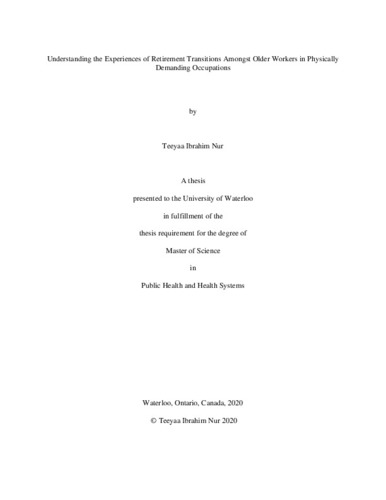| dc.contributor.author | Nur, Teeyaa | |
| dc.date.accessioned | 2020-10-21 19:33:37 (GMT) | |
| dc.date.available | 2020-10-21 19:33:37 (GMT) | |
| dc.date.issued | 2020-10-21 | |
| dc.date.submitted | 2020-09-16 | |
| dc.identifier.uri | http://hdl.handle.net/10012/16450 | |
| dc.description.abstract | Background and Objectives
Approximately 60% to 70% of Ontario workers have no pension – nonunionized workers are most affected, leaving many older workers in vulnerable positions. This vulnerability is exacerbated for individuals in physically demanding jobs. However, we know little about retirement motivations and how work affects health in this context. Precarity and financial insecurity in retirement planning and motivations are complex, multifaceted, and intersectional, especially for those in physically demanding occupations. Specifically, looking at these experiences as an account from the workers themselves is of increased importance. This is increasingly important to address in the Canadian context. This work presents an understanding of the ageing population's experiences, from the vantage point of older workers in physically demanding occupations, specifically as they approach retirement.
Methods
This study uses a qualitative research design to explore older workers' experiences and retirement motivations in physically demanding jobs. This study used convenience and snowball sampling to recruit 19 participants who were between the ages of 55 and 68, education (9), hospitality and tourism (3), food production (1) and Healthcare industries (6). This study used Semi-structured telephone interviews. Interviews were audio-recorded and transcribed using NVivo 12. This study used thematic analysis and a deductive approach to develop interview questions and analyze the data guided by the lidA Conceptual Framework using three thematic fields; Work Environment, Health, and Sociodemographic characteristics.
Results
Findings from this study identified that sociodemographic characteristics such as immigration and financial insecurities play a role in shaping participant retirement motivations. Themes were uncovered reflexively and revealed the impact each had on the precarity and insecurity of retirement and work motivations in later life. The following themes emerged: 1. Workers' demographic backgrounds are influential factors in determining precarity and insecurity; Systemic issues and organizational structures contribute to poor working environments that make working there more difficult and problematize retirement plans; 3. Physically demanding work exacerbates health issues and injuries; 4. How work is embedded in older workers' identities; 5. Social networks and individual strategies improve workers' outlook on work and retirement; and 6. Mentally demanding aspects of work feed into physical exertion.
Conclusion
By analyzing the experiences of older workers in physically demanding occupations, this study sought to illustrate how these workers experience ageing and retirement as they approach retirement. This was done by examining their motivations for retirement or continued workforce participation. Secondly, this study sought to dissect how workers feel their work affects their health and how their health affects their work.
The study's findings found that the experiences of older workers in physically demanding occupations as they approach or transition into retirement, with a particular emphasis on the interrelationship between work and health. This study identified the factors (motivations) that lead to early or delayed retirement linked to broader social structures through an account of their experiences, informed by previous findings of the lidA conceptual framework. This study elucidated the importance of further research on a larger scale to target areas and policies that could improve older workers transition into retirement better and reduce the burden of precarity and insecurity in later life for workers in physically demanding work. | en |
| dc.language.iso | en | en |
| dc.publisher | University of Waterloo | en |
| dc.subject | work | en |
| dc.subject | health | en |
| dc.subject | retirement | en |
| dc.subject | ageing | en |
| dc.subject | labour | en |
| dc.subject | immigrant | en |
| dc.subject | physically demanding work | en |
| dc.subject | manual labour | en |
| dc.title | Understanding the Experiences of Retirement Transitions Amongst Older Workers in Physically Demanding Occupations | en |
| dc.type | Master Thesis | en |
| dc.pending | false | |
| uws-etd.degree.department | School of Public Health and Health Systems | en |
| uws-etd.degree.discipline | Public Health and Health Systems | en |
| uws-etd.degree.grantor | University of Waterloo | en |
| uws-etd.degree | Master of Science | en |
| uws.contributor.advisor | Bigelow, Philip | |
| uws.contributor.affiliation1 | Faculty of Applied Health Sciences | en |
| uws.published.city | Waterloo | en |
| uws.published.country | Canada | en |
| uws.published.province | Ontario | en |
| uws.typeOfResource | Text | en |
| uws.peerReviewStatus | Unreviewed | en |
| uws.scholarLevel | Graduate | en |

